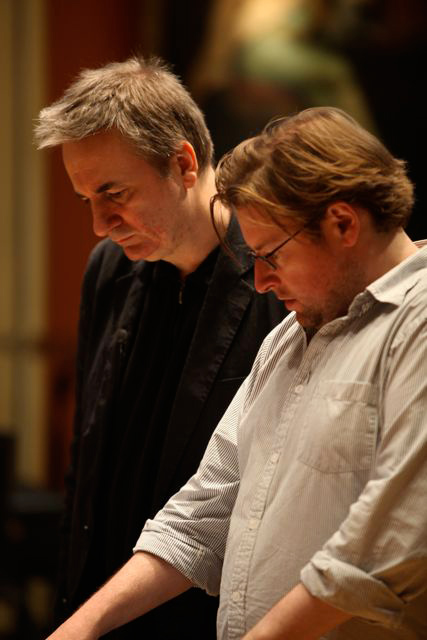
New pop
New pop is a loosely defined British-centric pop music movement consisting of ambitious, DIY-minded artists who achieved commercial success in the early 1980s through sources such as MTV. Rooted in the post-punk movement of the late 1970s, the movement spanned a wide variety of styles and artists, including acts such as Orange Juice, the Human League, and ABC. The term "rockist", a pejorative against people who shunned this type of music,[4][5] coincided with and was associated with new pop.[2]
For other uses, see New music (disambiguation)."New music" is a roughly equivalent but slightly more expansive umbrella term[6] for a pop music and cultural phenomenon in the US associated with the Second British Invasion.[7][8] The term was used by the music industry and by American music journalists during the 1980s to characterize then-new movements like new pop and New Romanticism.[9]
Characteristics[edit]
Many new pop artists created music that sweetened less commercial and experimental aspects with a pop coating.[2] Entryism became a popular concept for groups at the time.[2] New Music acts were danceable, had an androgynous look, emphasized the synthesizer and drum machines, wrote about the darker side of romance, and were British. They rediscovered rockabilly, Motown, ska, reggae and merged it with African rhythms to produce what was described as a "fertile, stylistic cross-pollination".[7] Author Simon Reynolds noted that the new pop movement "involved a conscious and brave attempt to bridge the separation between 'progressive' pop and mass/chart pop – a divide which has existed since 1967, and is also, broadly, one between boys and girls, middle-class and working-class."[1]
The terms "new music" or "new pop" were used loosely to describe synth-pop groups such as the Human League, soul-disco acts such as ABC, new wave acts such as Elvis Costello and the Pretenders,[6] jangle pop bands such as Orange Juice,[2] and American MTV stars such as Michael Jackson.[8] Stephen Holden of the New York Times wrote at the time that New Music was more about its practitioners than their sound. Teenage girls and males that had grown tired of traditional "phallic" guitar driven rock embraced New Music.[10] New Music was a singles oriented (both 7 inch and the then new 12 inch) phenomenon, reverting the 1970s rock music album orientation.[11]
Etymology[edit]
During the late 1970s, "New Musick" [sic] was one of the labels that was applied to certain post-punk groups.[12] The term "post-punk" was also deployed interchangeably with "new wave".[13] In the New Rolling Stone Encyclopedia of Rock (2001), "new wave" is described as a "virtually meaningless" term.[14] By the early 1980s, British journalists had largely abandoned "new wave" in favor of other terms such as "synthpop",[15] and in 1983, the term of choice for the US music industry had become "new music".[16]
Criticism and decline[edit]
Criticism of new pop emerged from both supporters of traditional rock and newer experimental rock. These critics looked at new pop as pro corporate at expense of rock music's anti-authoritarian tradition. Critics believed new pop's embrace of synths and videos were ways of covering in many cases lack of talent. The heavy metal magazine Hit Parader regularly used the homophobic slur "faggot" to describe New Music musicians. The 1985 Dire Straits song "Money for Nothing", which hit number 1 in the United States, contained the line "The little faggot with the earring and the make-up" and used the term "faggot" several other times.[23] The lyrics were taken verbatim from the language of a New York appliance store worker whom lead singer Mark Knopfler had observed watching MTV. Assistant professor/author/musician Theo Cateforis stated these are examples of homophobia used in the defense of "real rock" against new music.[24][25]
An American reaction against European synthpop and "haircut bands" has been seen as beginning in the mid-1980s with the rise of heartland rock and roots rock.[26] Richard Blade, a disc jockey at Los Angeles radio station KROQ-FM, speaking of the late 1980s said, "You felt there was a winding-down of music. Thomas Dolby's album had bombed, Duran Duran had gone through a series of breakups, the Smiths had broken up, Spandau Ballet had gone away, and people were just shaking their heads going, 'What happened to all this new music?' "[27] Theo Cateforis contends that the New Music evolved into modern rock that while different, retained New Music's uptempo feel and still came from the rock disco/club scene.[28] In the UK, indie bands adopted "the kind of jangling guitar work that had typified New Wave music",[29] with the arrival of the Smiths characterised by the music press as a "reaction against the opulence/corpulence of nouveau rich New Pop" and a "return to a different vision of 'new pop', the Postcard ideal."[30]